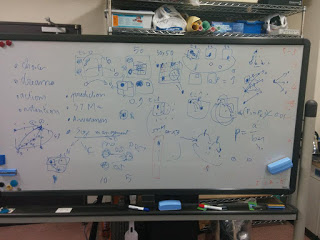I am Lana Sinapayen, and This is How I Work
 Today, I am inviting Lana Sinapayen in the “How I Work” series. Lana was born near Paris but raised in Martinique, a small French island in the Caribbean. She stayed stayed in Martinique until the end of high school, then joined an engineering school in Lyon. During her engineering years, she had the chance to travel to China, Vietnam and Japan. She liked Japan the most and went back several times before finally moving there in 2012.
Today, I am inviting Lana Sinapayen in the “How I Work” series. Lana was born near Paris but raised in Martinique, a small French island in the Caribbean. She stayed stayed in Martinique until the end of high school, then joined an engineering school in Lyon. During her engineering years, she had the chance to travel to China, Vietnam and Japan. She liked Japan the most and went back several times before finally moving there in 2012.
General:
Current Job: PhD Student
Current Location: Department of Complex Systems, Tokyo University, Japan
Current mobile device: Android
Can you briefly explain your current situation and research to us?
I am in my 2nd year of PhD at the Ikegami Lab and I specialise in Artificial Life / Artificial Intelligence.
I was born near Paris, but raised in a small French island in the West Indies (Martinique) where I lived until I graduated from high school. I then went back to the continent to attend an engineering school where I had the chance to learn new languages, like Japanese, and do an internship in the country. I decided to move to Japan before completing my Engineering degree and obtained an agreement that allowed me to get both a French degree as an IT engineer and a Japanese Master’s degree in Mathematics and Information Sciences from Tohoku University. In the meantime I worked for several Japanese companies as an intern.
After getting my Master’s I moved from Tohoku to Tokyo for my PhD. I now share my time between my research and a part time job to fund my education.
What tools, apps and software are essential to your workflow?
I spend much of my time presenting my research in conferences, at the lab or in papers, so my most essential tools are presentation tools. I use Google Drawings to sketch diagrams, R Studio to make figures from numerical results, and Prezi to shape up oral presentations.
I am a programmer at heart, so for my research itself I make my own tools and softwares.
Twitter is a wonderful tool to keep up with the latest interesting papers being published in fields that are close to mine but that I do not follow with assiduity.
What does your workspace setup look like?
As long as I have a computer, I can work anywhere. I work mostly at the lab, which has 3 rooms. I like to use the smallest one when I really need to concentrate; the biggest one when I want to discuss with my labmates. I also sometimes work at the library, in coffee shops before going to my student job, or simply at home.
What is your best advice for productive academic work?
Take a step back. It is easy to get very absorbed by a project, especially when deadlines approach. I have my best ideas when I let my mind wander: while riding the bus, eating lunch or listening to someone else’s ideas. When I try to be single minded and concentrate too much on a project, I loose creativity. I end up putting a lot of time and effort into things when, in retrospect, it would have been much more productive to step back and think.
How do you keep an overview of projects and tasks?
I usually don’t need to: the constant stream of emails and face-to-face discussions is sufficient to remind me of milestones and deadlines. I am lucky enough to have freedom in how I set my schedule. When I am really anxious about particular events, I use Google Calendar.
Besides phone and computer, do you use other technological tools in work and daily life?
Not really, except when working on particular projects. For several months I wore a mini-camera that essentially recorded my day in pictures, but this project is now finished. I use my phone a lot, especially because I like to build applications that are tailored to my needs.
Which skill makes you stand out as an academic?
I am not afraid to ask questions, express my ideas or admit my ignorance to other researchers and discuss theoretical concepts. There is absolutely no gender balance in my field, I am still a student, and I am sometimes the only foreigner in the conference room, so it could be easy to feel intimidated and refrain from discussing interesting or polemic points with other researchers.
But you do not get over these specifics without having a curious, assertive personality. I love reading scientific books or papers; discussing and criticizing them makes me feel enriched with new ideas and knowledge.
What do you listen to when you work?
Nothing, except if the place is noisy. Then I just let YouTube play random songs to mask the noise.
What are you currently reading? How do you find time for reading?
I read science books, science fiction books, or just fiction. But mostly I read scientific papers and the news. Since I have started working part time, I have unfortunately lost the time to read real books, or only just a few pages at a time.
Are you more of an introvert or extrovert?
I am an extrovert with my friends, I talk a lot and ask many questions, but I need a great amount of “alone time”. An hour of interaction is usually enough to drain me, and I will need quiet time to recover. I am also really bad at interacting with several persons simultaneously. I can only focus on one or two people at a time.
What’s your sleep routine like?
I normally sleep 7 to 8 hours, although I enjoy sleeping obscene amounts of time when I can afford it… When I am busy I sleep 4 or 5 hours per night, but I am not myself when I am tired.
What’s your work routine like?
I don’t really have a routine. I am always working on different things, there are always different events to attend to, and both my lab and my part time job have free hours. Not two days are the same, so I work as soon as I get some free time.

